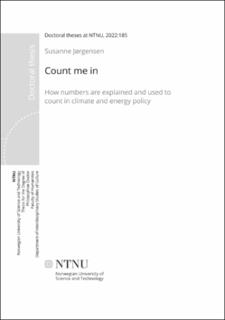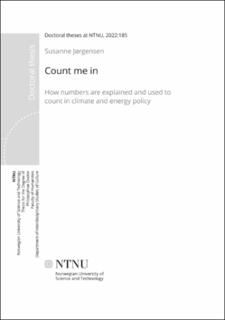| dc.contributor.advisor | Sørensen, Knut Holtan | |
| dc.contributor.advisor | Aune, Margrethe | |
| dc.contributor.advisor | Ryghaug, Marianne | |
| dc.contributor.author | Jørgensen, Susanne | |
| dc.date.accessioned | 2022-07-15T07:44:30Z | |
| dc.date.available | 2022-07-15T07:44:30Z | |
| dc.date.issued | 2022 | |
| dc.identifier.isbn | 978-82-326-5939-5 | |
| dc.identifier.issn | 2703-8084 | |
| dc.identifier.uri | https://hdl.handle.net/11250/3005660 | |
| dc.description.abstract | Norsk sammendrag
Kvantitativ informasjon antas ofte å ha en sterk, direkte effekt på politikk og beslutningstaking. Denne avhandlingen er en kritisk kommentar til slike antakelser. Den stiller spørsmål ved styrken til talls epistemiske autoritet og argumenterer for at idealet om mekanisk objektivitet for beregninger kan ha begrenset innvirkning på beslutningstakere. Forskningen er gjort i norsk kontekst og er hovedsakelig basert på intervjuer med aktører som produserer og formidler kvantitativ informasjon til beslutningstakere, og med beslutningstakere – både politikere og ansatte i forvaltningen.
Tre forskningsartikler utgjør kjernen i denne avhandlingen. Artiklene tar for seg ulike aspekter ved levering av og forholdet til epistemisk autoritet med hensyn til kvantitativ informasjon innen klima- og energipolitikk. Artikkel 1 diskuterer hvordan beslutningstakere konstruerer, tolker og bruker to norske overordnede numeriske mål: det første knyttet til klimagassutslipp og det andre til energieffektivitet i bygninger. Et sentralt funn er at begge målene var et resultat av en samproduksjon av vitenskap og politikk – en rekke hendelser, omstendigheter og aktører – over lang tid og med forskjeller angående den relative betydningen av vitenskap og politikk. Artikkel 2 fokuserer på tilleggsarbeidet (arbeidet som går utover kalkuleringsarbeid) til aktører som engasjerer seg i levering av kvantitativ informasjon til beslutningstakere. I artikkelen finner vi at slik tilleggsarbeid var nødvendig for å gjøre tall forstått og ansett som relevante for beslutningstakere. Konseptet ‘numerisk arbeid’ ble utviklet for å betegne disse tilleggsaktivitetene. Artikkel 3 undersøker bruken av tall og hvordan de oppfattes av beslutningstakere. Med utgangspunkt i domestiseringsteorien viser artikkelen at kvantitativ informasjon ikke ble brukt ubetinget av beslutningstakere. Snarere ble det funnet tre narrativer om domestisering av tall blant informantene. Sammen viser artiklene at tall ikke ble overført på en lineær måte fra eksperter til beslutningstakere som antatt i den lineære kunnskapsmodellen.
I den innledende sammenbindingen utforskes den epistemiske autoriteten til kvantifisering ytterligere ved å fokusere på science-policy relations (forholdet mellom vitenskap og politikk). Gjennom det teoretiske rammeverket kammermodellen inspirert av Bruno Latour og Robert Jomisko, kombinert med konseptene sosialisering av teknovitenskap og modaliteter, utforsker jeg hvordan science-policy relations påvirker talls epistemiske autoritet. Hovedfunnet er at science-policy relations om kvantifisering i norsk klima- og energipolitikk er interrelasjonelle. Analysen viser at både ekspertene som leverer beregningene og beslutningstakerne spiller en aktiv rolle i å forme den epistemiske autoriteten til kvantitativ informasjon og dermed hvordan den blir brukt. Videre viser denne avhandlingen at interaksjoner mellom eksperter og beslutningstakere er mer rotete enn det som antydes av Labours kammermodell for å analysere forhold mellom vitenskap og samfunn. Derfor argumenterer avhandlingen for at epistemisk autoritet blir til gjennom, og formet av, en ‘hybrid interaksjonsmodell’: nære, gjensidig avhengige og gjentatte prosesser for interaksjon mellom eksperter og beslutningstakere. | en_US |
| dc.description.abstract | English summary
Quantitative information is often assumed to have a strong, direct effect on policy and decision-making. This dissertation is a critical comment to such assumptions. It questions the strength of the epistemic authority of numbers and argues that the ideal of mechanical objectivity of calculations may have limited impact on policymakers. The research is mainly based on interviews with actors who provide quantitative information to policymakers and with policymakers, both politicians and experts in the government administration in Norway.
Three research papers make up the core of this dissertation. They address different aspects of the provision of and the relation to epistemic authority with respect to quantitative information in the field of climate and energy policy. Paper 1 discusses how policymakers construct, interpret, and employ two Norwegian superior numeric targets, the first related to greenhouse gas emissions and the second to the energy efficiency of buildings. A key finding is that both targets were resulted from a co-production of science and politics – a range of events, circumstances, and actors – over a long period of time and with differences regarding the relative importance of science and politics. Paper 2 focuses on the extra-calculative work by actors that engage in the provision of quantitative information to policymakers. Such efforts were needed to make numbers understood and considered relevant to policymakers. The concept of ‘numeric work’ was developed to designate these additional activities. Paper 3 examine the use of numbers and how they are perceived by policymakers. Drawing on domestication theory the paper shows that quantitative information was not used unconditionally by policymakers. Rather, three narratives of domesticating numbers were found among the interviewees. Together, the papers demonstrate that numbers were not transferred in a linear manner from experts to policymakers as assumed in the common linear-autonomy models.
In the introductory tie-up and conclusion essay, the epistemic authority of quantification is further explored by focusing on science-policy relations. Through a theoretical framework of bicameral models inspired by Bruno Latour and Robert Jomisko, combined with the concepts of socialisation of technoscience and modalities, I explore how science-policy relations influence the epistemic authority of numbers. The main finding is that science-policy relations concerning quantification in Norwegian climate and energy policy are inter-relational. The analysis show that both the experts providing the calculations and the policymakers play an active role in shaping the epistemic authority of quantitative information and thus how it is made use of. Furthermore, this dissertation show that experts and policymakers’ interactions are messier than what is suggested by Latour’s bicameral framework for analysing science-society relationships. Therefore, the dissertation argue that epistemic authority is provided through, and shaped by, a ‘hybrid interactional model’: close, interdependent, and repeated processes of interaction between experts and policymakers. | en_US |
| dc.language.iso | eng | en_US |
| dc.publisher | NTNU | en_US |
| dc.relation.ispartofseries | Doctoral theses at NTNU;2022:185 | |
| dc.relation.haspart | Paper 1:
Jørgensen, Susanne; Sørensen, Knut Holtan.
Transitions through numbers? A critical inquiry into superior numeric targets in climate and energy policymaking.
- The final published version is available in Energy Research & Social Science 2022 ;Volum 91.
https://doi.org/10.1016/j.erss.2022.102723
This is an open access article distributed under the terms of the Creative Commons CC BY license | |
| dc.relation.haspart | Paper 2:
Jørgensen, Susanne; Sørensen, Knut Holtan.
Numeric work: The efforts of calculation actors to make numbers count in climate and energy policy.
- The final published version is available in Science and Public Policy 2022
https://doi.org/10.1093/scipol/scac054
This is an open access article distributed under the terms of the Creative Commons CC BY license | |
| dc.relation.haspart | Paper 3:
Jørgensen, Susanne; Sørensen, Knut Holtan; Ryghaug, Marianne.
Guided by numbers. The domestication of quantitative information by Norwegian climate and energy policymakers.
4S+EASST | |
| dc.title | Count me in - How numbers are explained and used to count in climate and energy policy | en_US |
| dc.type | Doctoral thesis | en_US |
| dc.subject.nsi | VDP::Humaniora: 000::Kulturvitenskap: 060 | en_US |

